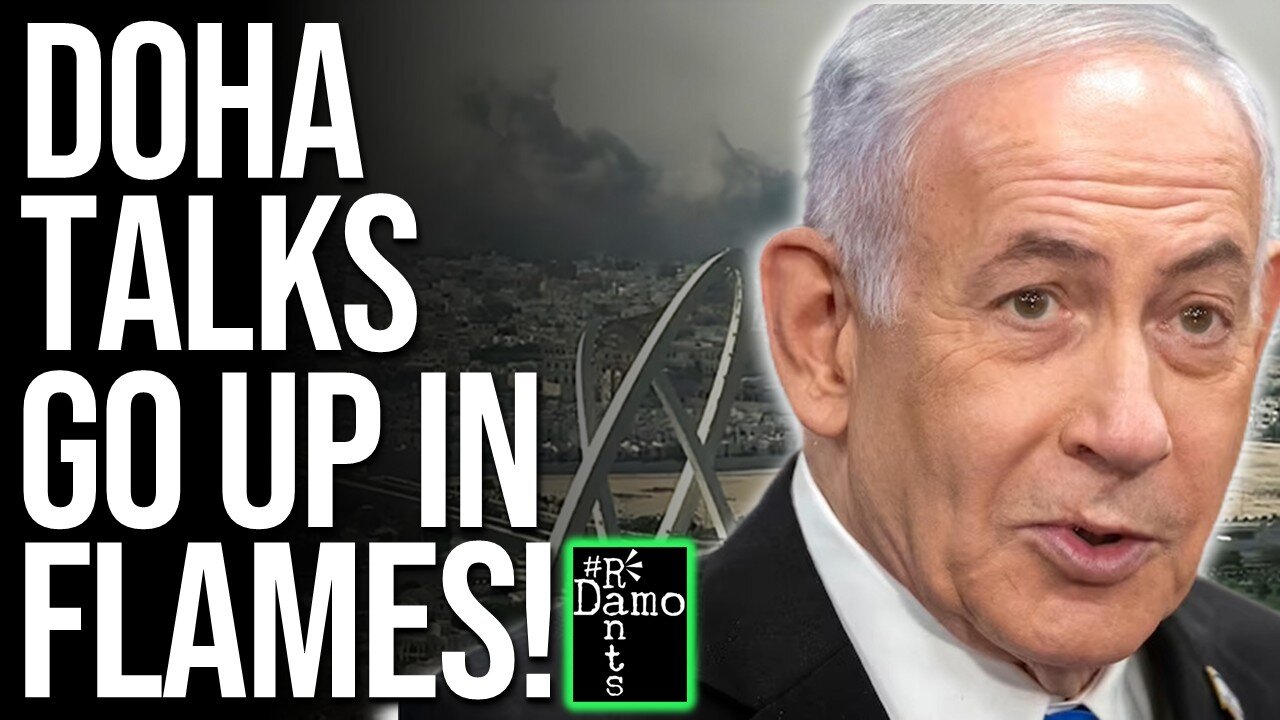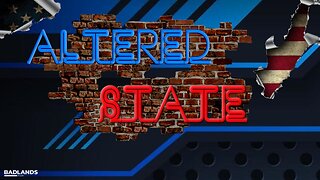Premium Only Content

Qatar Hosted Hamas Talks – And Israel Turned Them Into Targets
Right, so Israel has always had a knack for timing, but the strike on Doha yesterday was less “surgical precision” and more “diplomatic suicide note.” While Hamas officials leafed through Donald Trump’s ceasefire proposal in the safety of Qatar’s capital, Israeli missiles delivered the reply: a plume of smoke over Doha’s skyline and the death of diplomacy itself. Netanyahu called it retaliation, as if a Jerusalem stabbing somehow justified bombing a US ally’s capital. Trump mumbled that it was Netanyahu’s idea, even as Israeli sources insisted Washington approved. And Keir Starmer? His RAF refuelling plane just happened to be circling Doha, but apparently he “didn’t know.” If this is what diplomacy looks like, it’s less peace talks than a murder mystery: the negotiators lured into the room, and the ceasefire shot in the back.
Right, so yesterday, Israel crossed an all new line of depravity and insanity. For decades, Israeli leaders have shown contempt for Palestinian negotiators by assassinating them in Beirut, Damascus, and Gaza and the West Bank. Yet a fragile convention persisted: mediators and neutral grounds must be respected. The strike on Doha has destroyed that now. Israeli missiles tore into residential buildings in the Qatari capital, targeting senior Hamas political leaders as they reviewed a ceasefire proposal promoted by the United States, Donald Trump’s ceasefire plan. Smoke rose over Doha’s skyline as the illusion of diplomacy ended up getting burned away.
This was not a strike on a battlefield or even on the occupied Palestinian territories. It was a strike on the capital of a US ally and one of the most significant diplomatic mediators in the Middle East, especially where it has come to Israel and Hamas. At the moment of the attack, Hamas officials were engaged in reviewing Donald Trump’s proposed ceasefire framework, a plan that Israel’s Foreign Minister Gideon Saar had publicly just declared his country had accepted. Rather than nurturing diplomacy, Israel obliterated it instead. Qatar’s Prime Minister, Sheikh Mohammed bin Abdulrahman al-Thani, condemned the attack as an act of state terrorism and accused the United States of treachery, noting that the only warning Doha received came after the missiles were already in the air.
Donald Trump, anxious to maintain the illusion of being a master negotiator, he of the art of the deal, insisted that the decision to strike was Netanyahu’s alone. Israeli sources told a different story, reporting that the US had given approval. Meanwhile, the British government of Keir Starmer insisted it had no knowledge of the strike either, despite credible reporting that an RAF Voyager refuelling aircraft was circling over Doha at the very moment the bombs fell. What unfolded in Doha was not an aberration or a rogue operation. It was the execution of diplomacy itself, an event that not only killed off one ceasefire initiative but also destroyed the very possibility of future negotiations being conducted in good faith.
The events in Doha must therefore be understood within their immediate and historical contexts. Witnesses in Qatar described hearing explosions and seeing smoke plumes rising above the city as missiles struck residential buildings that housed Hamas leaders. Unlike Israel’s previous assassinations in Lebanon or Syria, this strike endangered ordinary Qatari civilians, expatriates, and the diplomatic corps present in Doha. It was, by all measures, the first time Israel had launched an overt attack on a Gulf state.
The timing was also significant for another reason. The Doha strike formed part of a broader campaign of Israeli attacks. Within twenty-four hours Israel had struck targets not only in Qatar, but also in Gaza, Tunisia, Lebanon, and Syria. The five strikes together were clearly choreographed to send a message of reach and intimidation. Yet Doha was unique because it was not a theatre of war but the capital of a US ally. Qatar hosts Al Udeid Air Base, the largest American military facility in the Middle East, struck symbolically by Iran back in June as a face saving exercise, US territory as that technically is rather than Qatari and has long been central to mediation between Israel and Hamas. By striking Doha, Israel violated not only Qatar’s sovereignty but also the assumptions underpinning US strategy in the region. The are a rogue state by every measure.
This was not simply about Hamas therefore. It was about demonstrating that no state, not even a US partner hosting thousands of American personnel, was immune from Israeli action. The implications for Gulf security and for the credibility of US alliances is immense, but that Israeli lobbyist money will keep many politicians in those states on message regardless in Israel’s favour.
Benjamin Netanyahu justified the strike by pointing to two immediate incidents: a terrorist attack in Jerusalem and the killing of four Israeli soldiers in Gaza. These claims echoed the long-standing Israeli narrative that every act of aggression is a form of retaliation by them. They are the victims always, it’s everyone else that is the problem. Israel Katz, the Defence Minister, went further, declaring that Israel would strike its enemies everywhere, an open-ended justification for global reach, entirely in keeping with his typically deranged dialogues.
Yet to describe the Doha strike as retaliation is grotesque. No serious observer could believe that a terrorist attack in Jerusalem or the death of four soldiers in Gaza justified bombing a mediator’s capital hundreds of miles away while a US ceasefire plan was under review. The logic collapses instantly under scrutiny. The Hamas leaders targeted in Doha were not plotting a terror attack, nor were they connected to the soldiers’ deaths. They were reviewing a document sent to them by mediators. To frame the attack as defensive is to dress sabotage in the language of retaliation.
This grotesque excuse reveals Israel’s deeper strategy. The strike was never about revenge. It was about ensuring that no ceasefire initiative could ever succeed. By bombing Hamas officials mid-discussion, Israel ensured that they could not formally respond to Trump’s plan, while simultaneously claiming that Israel had accepted the proposal and Hamas had refused to engage.
The role of the United States in this affair is nailed on too. The White House insisted that it had no role in approving the strike and that President Trump had ordered his envoy, Steve Witkoff, to warn Qatar once the US military learned of Israel’s intentions. According to this version of events, Washington attempted to prevent escalation.
Qatar told a different story. Its Prime Minister and Foreign Ministry declared that the only call they received came ten minutes after the bombs had already begun to fall. They branded US behaviour treacherous and rejected entirely the claim that they had been warned in advance.
Meanwhile, Israeli officials told the Jerusalem Post that the United States had indeed approved the strike. If true, this would mean that Trump not only knew of the attack but signed off on it while his own ceasefire proposal was under review.
The contradictions here expose the weakness of US diplomacy. Either Washington lied to cover its complicity or it was sidelined by Netanyahu in a manner that humiliates the claim of American leadership. Both interpretations confirm the collapse of credibility though. Trump’s desire to maintain the image of himself as a dealmaker meant he could not acknowledge that Netanyahu had destroyed his plan. He had to deny, distance, and deflect, all while allowing the reality of US complicity to stand.
Trump emerges from this not as a statesman but as a pawn. Believing himself to be the architect of peace, he allowed Netanyahu to use him as cover. The ceasefire plan was a prop, not a policy, and the Doha strike revealed it as such.
The United Kingdom, under Keir Starmer, also rushed to deny any prior knowledge of the attack. Starmer issued a public condemnation and insisted that Britain had been kept in the dark. It’s not going to stop him meeting Israeli President Isaac Herzog in Downing Street tonight though. But the evidence also shows otherwise. Independent reporting revealed that a British RAF Voyager refuelling aircraft was circling Doha at the time of the strike. Voyagers are not deployed for training flights over foreign capitals during a live warzone escalation. They are used to keep fighter jets in the air.
Some analysts argued that British Voyagers cannot directly refuel Israeli jets due to equipment incompatibility, but this misses the point. The presence of the aircraft during the strike indicates operational coordination. More importantly, Britain does not operate independently in Qatari airspace. All such flights are logged and cleared through US. CENTCOM at Al Udeid. This means that if the Voyager was airborne, the Americans knew, and if the Americans knew, it is implausible that Starmer’s government did not.
Starmer’s denials therefore look as hollow as Trump’s do. They reveal not a government ignorant of Israeli plans, but a government complicit and covering its tracks. His position is doubly humiliating: forced to parrot Trump’s framework in public while presiding over a military that very much looks like it facilitated the sabotage of that very framework.
Just days before the strike, Israel’s Foreign Minister Gideon Saar confirmed that Israel had accepted Donald Trump’s ceasefire plan. On paper, this suggested that Israel was open to a US-brokered solution. In reality, Israel was plotting to ensure the plan never took hold.
Trump’s proposal was not a genuine peace plan. It was designed to place Gaza under US administration or trusteeship, that vision of big gold statues of Trump and lots of casinos and golf courses, with Hamas disarmed and hostages released of course. For Washington, this was a way to stabilise the conflict without conceding Palestinian sovereignty, while allowing Trump to claim diplomatic credit and stamp his ego all over it. For Israel, however, it was still a threat. Netanyahu’s coalition, dominated by extremists like Smotrich and Ben-Gvir, wants direct control of Gaza itself. They have spoken openly of resettling the strip with Israelis and ensuring that Palestinians never again wield political autonomy there.
By publicly accepting the plan while assassinating those reviewing it, Israel achieved both diplomatic cover and practical sabotage in their own interests. The Doha strike was not merely an attack on Hamas; it was an attack on Trump’s plan, ensuring that the US could not place itself as the trustee of Gaza and Trump appears too stupid to see that.
Qatar has long prided itself on its role as mediator. From hosting Taliban talks to facilitating Hamas negotiations, it positioned itself as a neutral actor capable of bridging divides across the Middle East. The Doha strike destroyed that image.
Prime Minister al-Thani condemned the attack as state terrorism, cowardly, and a violation of international law. He declared that Qatar would not be deterred from its mediation role but acknowledged that the negotiations under review had been destroyed. More significantly, he accused Washington of treachery and announced that Qatar would form a legal team to pursue accountability. He reserved the right to respond, signalling a shift from passive mediation to active counteraction. So where they go from here will make for interesting viewing.
For Qatar, the strike was a humiliation. It revealed that neither its alliance with the United States nor its role as mediator provided protection. By bombing Doha, Israel exposed the vulnerability of the Gulf monarchies and the hollowness of US security guarantees.
The Houthis of Yemen, Ansarallah, issued a blistering statement condemning the Doha strike themselves too. They described it as a cowardly and treacherous crime carried out in coordination with the United States. They declared that no one enjoys American respect except Israel and warned Arab regimes that silence in the face of such crimes only invites further aggression. And they are right. Here we have proof that Israeli interests will always be put before theirs and in light of Netanyahu’s recent greater Israel comments, should make them all a bit more uncomfortable in their seats.
By linking the Doha strike to Israel’s previous attacks in Yemen, the Houthis reframed the event as part of a broader project of US-Israeli domination of the region. Their call for Arab regimes to unite against Zionist aggression underscored the sense that the Gulf itself is now under direct threat.
This intervention is important because it demonstrates how the Doha strike has regionalised the conflict. It is no longer confined to Gaza or even to the Levant. It now implicates the Gulf states themselves, forcing them to reckon with the reality that US alliances do not guarantee immunity from Israeli attacks.
If the strike itself left any ambiguity, the words of Yechiel Leiter, Israel’s ambassador to Washington, removed it. Speaking from the US capital, he threatened that if Israel failed to eliminate Hamas leaders this time, it would reach them next time. This was a direct threat to Qatar and a declaration that mediation is now a legitimate target and Israel may repeat this stunt again in future.
The consequences for a ceasefire are obvious. If Hamas leaders cannot attend talks without risking assassination, they will not attend and Israel has shown they will target them wherever they please. If Qatar cannot host without being bombed, it will struggle to mediate, the same goes for anyone else. If the United States cannot restrain its ally from bombing its own diplomatic partners, it cannot claim to lead diplomacy.
Leiter’s threat institutionalised what the Doha strike enacted: the transformation of diplomacy itself into a new battlefield.
The strike on Doha was part of a campaign of five strikes in twenty-four hours. The United Nations Secretary-General condemned the escalation as a flagrant violation of sovereignty, frankly with all of his hand-wringing and inaction it’s a wonder he has any skin left on his wrists. Regional powers, including Saudi Arabia and Egypt, issued statements of condemnation. Yet the United States remained conspicuously quiet, further underscoring its complicity.
The strike on Doha therefore represents more than just another escalation. It represents the death of diplomacy itself in this matter now. Ceasefires depend on trust, safe spaces, and the ability of mediators to act without being attacked. Israel destroyed all three. Hamas cannot trust that talks are safe. Qatar cannot guarantee neutrality. The US cannot guarantee credibility.
The implications reach beyond Gaza. If Israel can bomb Doha, it can bomb Cairo, Amman, Ankara, or even European capitals that host Palestinian negotiators, who would bet against it now? Be honest. The precedent is absolutely catastrophic.
The events in Doha on 9 September were not an aberration. They were the culmination of decades of Israeli duplicity, US complicity, and Western hypocrisy. Israel showed its two-faced diplomacy, accepting Trump’s plan in words while killing it in deeds. The United States showed its duplicity, approving or at minimum enabling the strike while pretending to pursue peace. Britain showed its complicity, circling Voyager aircraft over Doha while denying knowledge. Qatar showed its humiliation, condemned as both mediator and victim. The Houthis showed the regional consequences, reframing the strike as part of a US-Israeli project threatening all Arab regimes.
Most of all, the strike showed that diplomacy itself though is dead. Ceasefires have become traps, negotiations are now kill zones, and mediators’ capitals have battlefields. It’s been said before, but needs repeating – only a peacekeeping force, UN sanctioned, can stop this. Israel have to be made to stop and as much as negotiation should always be the answer, there is no possibility of that when one side cannot be trusted to act in good faith. Israel has declared that it will not pursue peace, only domination. Its allies, too cowardly or complicit or bought and paid for to restrain it, have revealed the hollowness of their claims to leadership.
But if diplomacy itself has been executed in Doha, the world now faces a dangerous question: what comes next? Who will be next? Will Arab states realign against US hegemony, emboldened by the Houthis’ defiance perhaps? Will new wars erupt as Israel expands its campaign of intimidation across the region as it has mooted with that Greater Israel ideology? Or will Israel’s impunity finally collapse under the weight of its own overreach, as allies lose credibility and legitimacy drains away?
The missiles that struck Doha did not just target Hamas. They killed diplomacy in this situation stone dead. The unanswered question is whether the world will continue this charade, this pretence of peace negotiation, or confront the reality that Israel and its allies have declared negotiation itself to be an act of war and act accordingly.
Another of those five strikes aforementioned did of course happen in Tunisia, the targeting of the Sumud Freedom Flotilla lead ship, a vessel called Family, another called Alma having been struck by Israeli drones since, making it all the tougher for Tunisia to claim it was a cigarette that set the boat alight, but if Israel is prepared to strike these ships all the way across the Mediterranean, just how scared are they of a load of civilians carrying baby formula and medicine? Get all the details of that story in this video recommendation here as your suggested next watch.
Please do also hit like, share and subscribe if you haven’t done so already so as to ensure you don’t miss out on all new daily content as well as spreading the word and helping to support the channel at the same time which is very much appreciated, holding power to account for ordinary working class people and I will hopefully catch you on the next vid. Cheers folks.
-
 2:48:00
2:48:00
TheSaltyCracker
11 hours agoYou're Being Hunted ReeEEStream 9-10-25
302K639 -
 13:09:56
13:09:56
LFA TV
1 day agoBREAKING: CHARLIE KIRK ASSASSINATED - WEDNESDAY 9/10/25
386K130 -
 1:31:08
1:31:08
I_Came_With_Fire_Podcast
10 hours agoCheck Fire: God Bless Charlie Kirk
100K31 -
 1:13:35
1:13:35
Glenn Greenwald
13 hours agoCharlie Kirk Assassinated; NATO Alleges Russian Drones Flew Over Poland, and More | SYSTEM UPDATE #512
299K321 -
 1:46:28
1:46:28
Badlands Media
1 day agoAltered State S3 Ep. 45: The Assassination of Charlie Kirk
178K30 -
 8:56:53
8:56:53
Dr Disrespect
19 hours ago🔴LIVE - DR DISRESPECT - THE FINALS - NEW SEASON 8 LAUNCH EVENT W/ THE SHOTTY BOYS
289K11 -
 27:00
27:00
BonginoReport
14 hours agoRest In Peace Charlie Kirk - Nightly Scroll w/ Hayley Caronia (Ep.131) - 09/10/2025
269K420 -
 1:20:06
1:20:06
Kim Iversen
14 hours agoRIP Charlie Kirk: When Words Fail, They Reach for Guns
191K360 -
 2:47:04
2:47:04
DDayCobra
15 hours ago $18.60 earnedCharlie Kirk SHOT
161K66 -
 1:14:30
1:14:30
Redacted News
14 hours agoBREAKING! CHARLIE KIRK SHOT BY ASSASSIN IN UTAH, TRUMP CALLS FOR NATIONAL PRAYERS
340K544